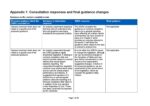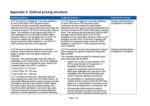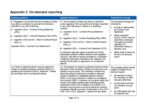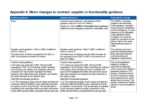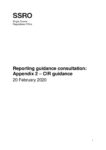This consultation has concluded
Detail of outcome
On 11 November 2020, the SSRO published version 9 of the reporting guidance on contract reports, version 9 of the reporting guidance on DefCARS functionality, and version 8 of the reporting guidance on supplier reports.
The main changes in version 9 of the contract reports guidance are:
- guidance on determination and reporting of the contract completion date, including how the contractor may report a changed contract completion date in DefCARS, so that the contract reporting plan is updated, and the correct due dates of reports are generated;
- explanation of the following terms used in the Regulations: “price the contracting authority is committed to paying”, and “contract price”;
- revised guidance for on-demand Contract Pricing Statements and Contract Reporting Plans for which separate reports have been introduced into DefCARS;
- specification of what the contractor should do to complete some fields in DefCARS, including where “yes/no” fields are included in the system to assist contractors to complete their submissions; and
- better explanation of some DefCARS functionality, such as how it generates annual profile years, and better description of what the contractor should expect to see on some pages.
The main change in version 8 of the supplier reports guidance relates to:
- clarification that the £10 million Qualifying Business Unit threshold applies to a business unit that provides goods, works or services for the purposes of any QDC or QSC in the period.
The main changes in version 9 of the DefCARS functionality guidance are:
- the removal of the ability to download reports in PDF format within DefCARS;
- the addition of copy & paste facility for the reporting of variances, events and circumstances and of key deliverables; and
- guidance on how to view multiple DefCARS reports in a web browser.
Original consultation
Summary
Consultation description
The SSRO’s guidance helps defence contractors to prepare and submit reports required under the Defence Reform Act 2014 and the Single Source Contract Regulations 2014. Contractors must have regard to the SSRO’s guidance when preparing contract and supplier reports under the Act and the Regulations.
The SSRO is consulting on changes to parts of its current guidance. The current guidance is DefCARS – contract report guidance – Version 8 published on 24 June 2020
This consultation is open to all interested persons. We particularly welcome comments from individuals or organisations with an interest in single source defence procurement and ensuring that good value for money is obtained in government expenditure on qualifying contracts and that the prices paid under these contracts are fair and reasonable.
The consultation runs until 1 September 2020. Written responses should be sent by email to:
- consultations@ssro.gov.uk (preferred); or
- by post to SSRO, Finlaison House, 15-17 Furnival Street, London, EC4A 1AB.
The SSRO welcomes the opportunity to meet with stakeholders to discuss the proposals during the consultation period. If you wish to arrange such a meeting, please contact us at the earliest opportunity via simon.mccullough@ssro.gov.uk.
Consultation outcome
Reporting guidance update: Summary of changes and response to consultation
Updated 11 November 2020
1. Updates to the reporting guidance
The SSRO released the following updated guidance on 11 November 2020:
- Reporting guidance on contract reports, version 9;
- Reporting guidance on supplier reports, version 8;
- Reporting guidance on DefCARS functionality, version 9; and
- DefCARS validation checks.
The revisions to the guidance address the following areas:
- Contract completion date and guidance on the initial contract reports;
- Defined pricing structure;
- On-demand reporting, specifically the contract pricing statement and the contract reporting plan;
- Other minor changes; and
- Updates to validation rules.
This report provides a detailed outline of where changes have been made to the guidance. The report is not itself guidance and stakeholders should have regard to the published guidance documents to understand the SSRO’s guidance on the preparation of statutory reports under the regulatory framework.
Some of the revisions to the guidance were the subject of recent consultation. The SSRO’s response to that consultation is also provided in this report.
2. Response to consultation
On 20 February 2020, the SSRO issued a set of reporting guidance consultation documents on its website and to its Reporting and IT sub-group members for consultation for a period of eight weeks. To allow for the impact of the COVID-19 pandemic, the SSRO extended its consultation to 1 September 2020, giving stakeholders more time to respond.
The SSRO consulted on reporting guidance proposals in the following areas:
- Contract completion date; and
- Changes to its guidance on the initial contract reports.
The SSRO received input on the draft guidance at its Reporting and IT sub-group meeting with key stakeholders on 25 February 2020. In addition, the SSRO received written responses from five stakeholders from the stakeholder groups set out in Table 1.
Table 1 – Stakeholder responses to consultation
| Organisation | Number of responses |
|---|---|
| Ministry of Defence | 1 |
| Industry respondents | 4 |
| Total | 5 |
We would like to thank respondents for sharing their views with us. We have considered all responses in drafting this consultation response document and set out the reasons for the changes we have decided to make. The changes are reflected in version 9 of the SSRO’s contract report guidance and will be explained to the Reporting and IT sub-group at its meeting on 25 November 2020.
The responses received to the consultation, and any resulting changes which the SSRO has decided to make, are set out in Appendix 1 of this document. The final guidance in this appendix details the paragraph numbering as applicable to the published version of the guidance.
3. Other guidance changes
3.1 The defined pricing structure (DPS)
During its review of reporting requirements in 2019 the SSRO consulted on changes to two paragraphs of its contract report guidance on the DPS used to split costs in the contract reports. The findings of the review were published in June 2020 and confirmed that changes would be made to the guidance on contract reports. The final guidance on these DPS paragraphs has been introduced to the contract report guidance in this update. The changes are summarised in Appendix 2.
3.2 On-demand report functionality
The proposal to develop on-demand report functionality and associated reporting guidance as part of the amendments and variance project has been the subject of engagement with stakeholders, including discussion at the Reporting and IT sub-group in July 2019 and as part of the SSRO’s review of legislation consultation in December 2019. The SSRO has worked to simplify the on-demand report capability within DefCARS, and the guidance on this functionality has been introduced to the contract report guidance in this update. The changes are summarised in Appendix 3.
3.3 Minor changes
We have made additional minor changes to the guidance, which seek to provide better explanation of some DefCARS functionality and better descriptions of what the contractor should expect to see on some pages and how to complete those pages. These changes have been introduced across the contract report, supplier report and DefCARS functionality guidance in this update. The changes are summarised in Appendix 4. Consequential changes to other parts of the guidance have been made, such as updates to paragraph numbering and cross referencing. These changes are not detailed in this document.
3.4 Updates to validation rules
The system has been developed to carry out a range of automatic validation checks at the point of report submission, providing information on whether reporting requirements are being met. The SSRO keeps the set of validation warnings under review to ensure they target reporting requirements in a proportionate way. We have identified some additional validations, which have been introduced into DefCARS and are identified in our list as version 6. We have also amended the wording of some validation warnings. The full set of validation warnings can be seen on our website.
4. Further feedback
This report will be published on the SSRO website on 11 November 2020, together with the updated guidance. The SSRO continues to welcome feedback on improvements to its reporting guidance. To provide feedback or to seek assistance with reporting please email us at helpdesk@ssro.gov.uk or telephone 0203 771 4785.
Consultation outcome
Reporting guidance consultation paper
Updated 11 November 2020
1. Introduction
1.1 The SSRO is consulting on proposed changes to its reporting guidance. The proposals are detailed in this document.
1.2 The SSRO’s guidance on the preparation and submission of reports is statutory guidance which helps contractors to meet their reporting requirements under the Defence Reform Act 2014 and the Single Source Contract Regulations 2014 (the Regulations). Regulation 22(9) requires a contractor to have regard to any relevant guidance issued by the SSRO when preparing contract reports. Regulation 33(8) requires the designated person to have regard to any relevant guidance issued by the SSRO when preparing supplier reports.
1.3 The SSRO regularly updates its reporting guidance to:
- reflect learning from operation of the regulatory framework, particularly feedback about preparing and submitting reports;
- align with the Defence Contract Analysis and Reporting System (DefCARS), where functionality is regularly improved to reduce the reporting burden on contractors; and
- support any changes in the reporting requirements set out in the legislation.
1.4 This consultation document has been issued to stakeholders and will be published on the SSRO’s website. Section 3 addresses how feedback can be provided.
2. Consultation topics
2.1 This section and the appendices detail proposed changes to the SSRO’s reporting guidance for contract reports. Consultation questions are included to guide feedback, but comments are welcome on any aspects of the proposals.
Date a contract completes
2.2 Contractors are required to report the contract completion date of each qualifying contract and of associated sub-contracts. The SSRO is proposing to provide guidance to assist contractors to consistently report the contract completion date in DefCARS and to update it if the date changes. The draft guidance is set out at Appendix 1.
2.3 Regulation 4(1) provides three approaches for determining the contract completion date. The draft guidance assists with determining the following matters, which are used to define contract completion date:
- whether a contract completion date is described in the contract;
- the date on which the contractor expects to complete all obligations entitling it to final payment; and
- the date on which the contract is terminated.
2.4 The draft guidance also identifies the circumstances in which the contract completion date may change and the implications for due dates of contract reports. The guidance details how the contractor may report a changed contract completion date in DefCARS, so that the contract reporting plan is updated and the correct due dates of reports are generated.
The SSRO seeks input from stakeholders on the proposed guidance at Appendix 1. Feedback would also be welcomed on any reporting issues experienced in identifying the contract completion date, or with reporting or updating the contract completion date in DefCARS.
Guidance on the initial contract reports
2.5 Contractors are required to submit three initial reports for a qualifying contract:
- contract pricing statement (CPS);
- contract reporting plan (CRP); and
- contract notification report (CNR).
2.6 DefCARS enables contractors to make a single submission for the initial reports through a Contract Initiation Report (CIR). The SSRO’s reporting guidance on contract reports deals with preparation of the CIR in section 4.
2.7 The SSRO proposes to update its guidance on the CIR as set out at Appendix 2. The changes are intended to:
- Include further definitions, such as the “price the contracting authority is committed to paying”, which contractors are required to report in the CRP following the Single Source Contract (Amendment) Regulations 2019, and “contract price”.
- Clarify who carries out some actions, for example whether it is the contractor, SSRO or the MOD.
- Specify what the contractor should do to complete some fields in DefCARS, including where “yes/no” fields are included in the system to assist contractors to complete their submissions.
- Improve readability, for example by including cross-references and defining abbreviations or acronyms.
- Better explain some DefCARS functionality, such as how it generates annual profile years, and describe what the contractor should expect to see on some pages.
2.8 The changes have been informed by changes to the Regulations, changes made to other parts of the SSRO’s guidance during 2019 and feedback received from contractors in onboarding discussions.
The SSRO seeks input from stakeholders on the proposed guidance at Appendix 2. Feedback would be welcomed on any reporting issues experienced with identifying the price the contracting authority is committed to paying, or with other aspects of completing the initial reports.
3. Consultation
3.1 The consultation period for this set of proposals is Thursday 20 February to Thursday 16 April 2020. Consultation responses should be sent to consultations@ssro.gov.uk. There is no specified format for response.
3.2 The Reporting and IT sub-group of the SSRO’s Operational Working Group continues to be a key source of input to the SSRO’s reporting guidance and DefCARS. We propose to discuss the proposed changes at the next meeting on Wednesday 26 February 2020. If you would like to speak to us outside of the Reporting and IT sub-group, please contact Simon McCullough at simon.mccullough@ssro.gov.uk, or telephone 0203 771 4794.
3.3 Feedback on the consultation process and the final changes the SSRO has decided to implement will be provided to the Reporting and IT sub-group at its meeting in June 2020.
4. Next steps
4.1 The SSRO plans to publish version 8 of its reporting and DefCARS user guidance in June 2020. This will depend on changes in the wider work programme and any other material events, such as introduction of new Regulations.
4.2 The content of each planned guidance update will depend on stakeholder feedback and the timing of any associated DefCARS development. Each release may include additional minor, uncontroversial or urgent changes that have not been the subject of consultation.
5. Appendices
5.1 The following appendices set out the SSRO’s guidance proposals for consultation:
- Appendix 1 – Contract completion date guidance
- Appendix 2 – Contract initiation report guidance
Consultation outcome
Appendix 1 – contract completion date
Updated 11 November 2020
For insertion in contract report guidance after paragraph 3.30 on page 14
1.1 Contractors are required to report the contract completion date of each qualifying contract and of associated sub-contracts. The circumstances in which contract completion dates are required to be reported are set out in Table 1.
Table 1 – Contract completion date in contract reports
| Regulation | Report | Requirement |
|---|---|---|
| 22(2)(i) | All | Each contract report must contain the contract completion date (or, if that date is not known, the expected contract completion date). |
| 25(2)(l)(vii) | CNR | The contractor must report the contract completion date (or, if that is not known, the expected contract completion date) of sub-contracts valued at £1 million or more. |
| 26(6)(k)(vii) | QCR | The contractor must report the contract completion date (or, if that is not known, the expected contract completion date) of sub-contracts valued at £1 million or more. |
| 27(5)(e)(vii) | ICR (contract value < £50 million) | The contractor must report the contract completion date (or, if that is not known, the expected contract completion date) of sub-contracts valued at £1 million or more. |
| 28(2)(p)(vii) | CCR | The contractor must report the contract completion date (or, if that is not known, the expected contract completion date) of sub-contracts valued at £1 million or more. |
1.2 Regulation 4(1) provides that the “contract completion date”, in relation to a contract, means:
a. the date described in the contract as the contract completion date; or
b. if no such date is described in the contract, the date on which the contractor completes all obligations which entitle it to final payment under the contract; or
c. if the contract is terminated before the date described in sub-paragraph 1(a) or (b) (as the case may be), the date on which the contract is terminated.
1.3 Determination of the contract completion date is, firstly, by application of regulation 4(1)(a). The contractor will need to determine whether the contract completion date has been described in the contract. If not, then regulation 4(1)(b) applies and the contractor will need to determine the contract completion date by reference to when all obligations, which entitle it to final payment from the contracting authority, are complete. If the contract is terminated, then regulation 4(1)(c) will apply to determine the contract completion date. The first two approaches in regulations 4(1)(a) or (b) are mutually exclusive, so if one of them applies, the other will not.
Date described in the contract
1.4 If the contract contains a date which is described as the contract completion date, then that date is the contract completion date. The following examples show how a contract completion date of 31 December 2026 may be sufficiently described in a contract to satisfy the definition:
- The contract completion date is 31 December 2026; or
- Completion of the contract shall be 31 December 2026; or
- The parties agree that the date for completion of the contract is 31/12/2016.
1.5 The key requirement for describing the contract completion date in the contract in a way that satisfies regulation 4(1)(a) is that the description used clearly and unambiguously indicates both the date and that it is the contract completion date. A reference merely to the date on which the main contract deliverable is to be provided may be insufficient.
1.6 If a contract completion date is described in the contract, there will be no need to apply regulation 4(1)(b) (the date on which all obligations are completed entitling the contractor to final payment). The parties to the contract may change the contract completion date by amending the contract. Paragraphs 1.18 – 1.21 identify how the contractor should deal with reporting a new contract completion date.
Completion of all obligations entitling the contractor to final payment
1.7 Where the contract does not describe the contract completion date in line with regulation 4(1)(a), and assuming the contract has not been terminated, the contract completion date is determined by regulation 4(1)(b). The contract completion date will be the date that all obligations which entitle the contractor to final payment have been completed.
1.8 If a contractor submits a contract report prior to the contract completion date, it will have to anticipate or predict the date on which it will complete the obligations that entitle it to final payment. The contractor should exercise its best judgment in making this prediction, considering all relevant circumstances, such as:
- the terms of the contract;
- performance to date;
- information provided by the MOD; and
- any material events and circumstances.
1.9 The contractor’s expectation of when it will complete all obligations entitling it to final payment under the contract may change as the contract progresses. There are many reasons why this may be the case, including changed requirements, unexpected circumstances and poor performance. Paragraphs 1.18 – 1.21 identify how the contractor should deal with reporting a new contract completion date.
1.10 There are payments that should not be considered when determining the contract completion date under regulation 4(1)(b). First, regulation 4(2) provides that the following payments are not final payments:
- any payment relating to the effect of specified indices or rates (regulation 10(5) or (10));
- any TCIF adjustment; any payment under regulation 16 (final price adjustment); and
- any amount which is determined by the SSRO to be payable.
1.11 Secondly, a contract may contain accrued obligations which continue beyond when obligations which attract final payment have completed. Foreseeably, these will include:
- an obligation to keep relevant records (regulation 20);
- an obligation to co-operate with the contracting authority in respect of requests under the Freedom of Information Act 2000; and
- an obligation in respect to the payment of damages under a warranty.
1.12 Unless obligations attract a payment under the contract from the contracting authority, they should not be considered when determining the contract completion date under regulation 4(1)(b).
Termination of the contract
1.13 A contract may be terminated in advance of the expected contract completion date. If that occurs, then regulation 4(1)(c) provides that the contract completion date will be the date on which the contract is terminated.
1.14 Determining the date of termination of a contract will depend upon the mechanism by which the contract is terminated and how it is exercised. For example, if a contract is terminated by exercising a contractual right to do so on giving 30 days’ notice, the date on which the contract is terminated may be stated in the notice of termination. Issues may arise in determining whether a contract has been terminated and, if so, the date on which termination takes effect, for example:
- whether notice has been given in the required manner and form, if any;
- correct identification of the date on which notice takes effect; and
- correct determination of when any notice period expires.
1.15 The contract may specify circumstances which give rise to termination and the requirements for doing so. There may also be relevant provision in statute and common law. The contractor should consider taking legal advice to ensure the contract completion date is correctly identified for the purposes of reporting.
1.16 A contract completion date is likely to be determined under regulation 4(1)(c) (termination of the contract) after a contract completion date has already been reported in earlier contract reports. Paragraphs 1.18 – 1.21 identify how the contractor should deal with reporting a new contract completion date.
Contract completion dates in different contracting arrangements
1.17 The contract completion date is determined on a contract-by-contract basis, and not by reference to other contracts which may be linked or subject to it. For example, a QDC may contain a date which is described as the contract completion date. This would be the contract completion date of the QDC in accordance with regulation 4(1)(a). A QSC, which is let under that QDC, may have a contract completion date which is determined under regulation 4(1)(b). In that situation the contract completion date of the QSC may fall before, on, or even after the contract completion date of the QDC. A similar situation could arise in respect of a QDC which is a framework agreement. Contracts let under a framework agreement may have contract completion dates which fall before, on, or after the contract completion date of the framework agreement, but they will not change the contract completion date of the framework agreement.
Changes to the contract completion date
1.18 The contract completion date may change in the following circumstances:
- The contract completion date is described in the contract and the parties amend the contract to change the described date.
- The contractor’s prediction of when it will complete all obligations entitling it to final payment under the contract changes due to some change in circumstances.
- The contract is terminated in advance of the expected contract completion date.
1.19 The contract completion date is used to establish the due dates of the CCR and CCS. It is also the date following which no further ICRs or QCRs are required. Table 2 summarises the effect of the contract completion date on other reporting requirements.
Table 2 – Reporting dates established or qualified by the contract completion date
| Regulation | Report | Requirement |
|---|---|---|
| 26(1) | QCR | QCRs must be provided in respect of contracts with a value of £50m or more for each calendar quarter until the contract completion date. |
| 27(2)(a)(ii) and 27(3)(a)(ii) | ICR | Where the parties agree the dates on which ICRs are to be submitted, those dates must fall before the contract completion date. |
| 28(1) | CCR | A contractor is required to provide a CCR within six months after the contract completion date. |
| 29(1) | CCS | A contractor is required to provide a CCS within twelve months after the contract completion date. |
| 30(1) and 30(3) | On-demand reports | The Secretary of State may require by written direction a contractor to provide a CCS for specified periods, each such period ending on a date before the contract completion date. The Secretary of State may require by written direction a contractor to provide a CPS, CRP, ICR and CCS, each such direction being made before the contract completion date. |
1.20 If the contract completion date changes, the contractor must report the correct contract completion date in subsequent contract reports. There will not always be a subsequent QCR or ICR in which such a change can be reported. In part, this will depend on the timing of the change in the contract completion date. It is also relevant that contracts valued below £50 million do not require QCRs and that ICRs may be infrequent, subject to any agreement reached by the parties as to when ICRs will be required.
1.21 DefCARS will calculate the due dates of reports based on the contract completion date that the contractor has reported in the Contract Reporting Plan (CRP). A changed contract completion date in a QCR or ICR will not update the CRP. If the contract completion date reported in the CRP is no longer accurate, the contractor should consider updating the CRP, otherwise the contractor may receive compliance queries and system prompts for submission of the reports in Table 2. The MOD may direct the submission of an on-demand CRP, to ensure the updated contract completion date and changed reporting requirements are recorded, or the contractor may agree to provide an on-demand CRP without written direction (Regulation 24(2)(c)). DefCARS enables a contractor to submit an additional CRP by selecting On-Demand Report when seeking to add a CIR. Section 9 of this guidance deals with the submission of on-demand reports.

